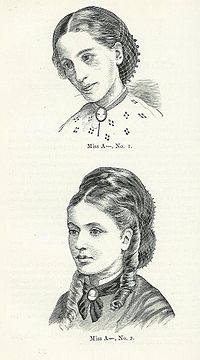
Photo from wikipedia
Exposure to trauma in the childhood and abnormal interpersonal stress reactivity are believed to contribute to the pathophysiology of anorexia nervosa (AN), which suggests a possible role of the hypothalamus-pituitary… Click to show full abstract
Exposure to trauma in the childhood and abnormal interpersonal stress reactivity are believed to contribute to the pathophysiology of anorexia nervosa (AN), which suggests a possible role of the hypothalamus-pituitary adrenal (HPA) axis. Although an effect of early traumatic experiences on the cortisol awakening response has been proved in patients with AN, the consequences of childhood trauma exposure on HPA axis reactivity to psychosocial stressors has been never investigated in such individuals. Therefore, we have assessed emotional and cortisol responses to an acute psycho-social stress in AN patients with a history of childhood trauma exposure. Twenty-four AN women and 17 healthy women were enrolled in the study. Patients were classified as maltreated (Mal) or non-maltreated (noMal) according to their Childhood Trauma Questionnaire scores. Participants underwent the Trier Social Stress Test (TSST) and their emotional responses were measured through the state scale of the State-Trait Anxiety Inventory. Saliva samples were collected to measure cortisol production. Compared to both healthy subjects and noMal AN patients, Mal AN women exhibited a blunted cortisol response to TSST. With respect to healthy controls, pre-TSST anxiety levels were enhanced in both AN groups; moreover, Mal AN patients displayed a reduced anxiety increase after TSST as compared to both noMal patients and healthy women. Our findings for the first time provide the evidence of deranged biological and emotional responses to an acute social stress in AN patients with childhood trauma exposure, corroborating the idea of a maltreated ecophenotype in AN as in other psychiatric disorders.
Journal Title: Journal of psychiatric research
Year Published: 2018
Link to full text (if available)
Share on Social Media: Sign Up to like & get
recommendations!